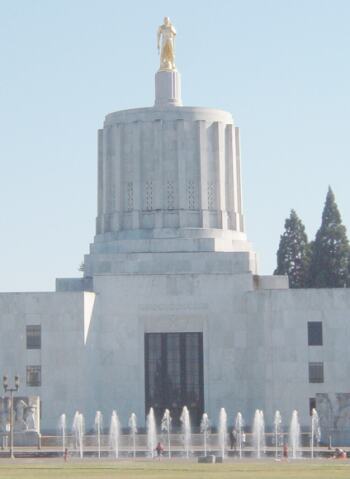
Publisher:
Bonnie King
CONTACT:
Newsroom@Salem-news.com
Advertising:
Adsales@Salem-news.com

~Truth~
~Justice~
~Peace~
TJP
Jun-20-2007 12:14

 TweetFollow @OregonNews
TweetFollow @OregonNews
Governor Signs Anti-Price Gouging and Consumer Protection Laws
Salem-News.com Capitol WatchSB 118 establishes the first anti-price gouging bill, SB 117 enforces the “Do Not Call List” and SB 122 stops promotional checks that cause payment when cashed.
 Salem-News.com |
(SALEM, Ore. ) - Governor Ted Kulongoski was joined by Attorney General Hardy Myers to sign three pieces of legislation that complement the Governor’s consumer protection package, which will strengthen the tools of the executive branch and individual Oregonians to protect themselves and their families from unfair business practices. “This legislation will provide greater protections for Oregonians against deceitful, unlawful and unfair business practices – while giving consumers the tools they need to protect themselves and their families,” said Governor Kulongoski. Under Senate Bill 118, Oregonians for the first time will have protection from paying extremely high prices during a natural disaster, crisis or human-created emergency.
Specifically, Senate Bill 118 grants the Governor the authority to declare – for up to 30-days – that the marketplace has been abnormally disrupted after a natural disaster or emergency.
This legislation also makes it a specific violation of the Oregon Unlawful Trade Practices Act if merchants or wholesalers sell or offer to sell any essential consumer goods or services for an amount that is unconscionably excessive during a declared abnormal disruption of the market. “Hurricane Katrina showed us what a natural disaster can do to a community, city and state,” Governor Kulongoski said. “We all watched as hotel prices leapt to extraordinary prices – and gas and other necessities were priced out of reach for many people. Today we assure Oregonians that we will not let that happen to them in the event of an emergency or natural disaster.” The signing of Senate Bill 122 stops the practice of businesses sending consumers promotional checks that create financial obligations once signed.
These marketing tools often come in small amounts, but can create financial hardships for Oregonians who mistake the checks for being real. The Governor also signed Senate Bill 117, which authorizes the Oregon Department of Justice to prosecute violators of the National Do Not Call Registry, which can carry a penalty of up to $25,000 per violation.
Oregon had a No Call list from 1999 to 2003, but eliminated the list after Congress adopted a nationwide registery. The Governor also signed a series of other bills during a private bill signing session last week. Highlights include bills to: Protect Students HB 2606: This legislation gives students the opportunity to graduate from high school and receive a diploma in less than four years, if they have fulfilled all graduation requirements set by the State Board of Education. In order to comply, a student must request early graduation and receive parental consent. A student can also advance to the next grade level upon parental consent and fulfillment of requirements for that grade level. SB 517: This bill makes it illegal for school district employees, contractors and volunteers from selling, marketing, distributing, endorsing or suggesting anabolic steroids or performance-enhancing drugs to students. Schools must also provide information on anabolic steroids and performance enhancing drugs and abuse in health and physical education classes. Protect Patients: HB 2993: This requires the state to supply information to patients about home health services such as therapists, nurses, social workers and health aides who can perform services in the home. Many of these services tend to be more cost effective for patients. SB 620: This law gives a “naturopathic physician” the authority to submit reports on a patient to the State Health Officer regarding the abilities of the patient with a mental or physical condition or impairment to safely operate a motor vehicle. Protect Animals: SB 439: This legislation prohibits animals from participating in a race if within 24 hours of the race start they have been given an illegal drug, as determined by the Oregon Racing Commission. This law also bans an animal from racing if any drug is detected in its system or if its performance in the race appears to be affected.
Articles for June 19, 2007 | Articles for June 20, 2007 | Articles for June 21, 2007
Quick Links
DINING
Willamette UniversityGoudy Commons Cafe
Dine on the Queen
Willamette Queen Sternwheeler
MUST SEE SALEM
Oregon Capitol ToursCapitol History Gateway
Willamette River Ride
Willamette Queen Sternwheeler
Historic Home Tours:
Deepwood Museum
The Bush House
Gaiety Hollow Garden
AUCTIONS - APPRAISALS
Auction Masters & AppraisalsCONSTRUCTION SERVICES
Roofing and ContractingSheridan, Ore.
ONLINE SHOPPING
Special Occasion DressesAdvertise with Salem-News
Contact:AdSales@Salem-News.com



Salem-News.com:

Terms of Service | Privacy Policy
All comments and messages are approved by people and self promotional links or unacceptable comments are denied.
[Return to Top]
©2026 Salem-News.com. All opinions expressed in this article are those of the author and do not necessarily reflect those of Salem-News.com.